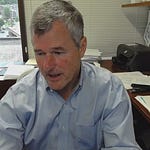I’m joined by Matthew Gianni, an independent consultant, advisor, and advocate for marine conservation based in the Netherlands. He is co-founder of the Deep Sea Conservation Coalition and currently serves as its Political and Policy Advisor. Matthew has been involved in international fisheries and marine conservation law and policy for nearly 30 years, working across the UN General Assembly, FAO, regional fisheries bodies, and the International Seabed Authority.
In this wide-ranging conversation, we dig into the core dilemmas of seabed mining: governance, biodiversity loss, economic trade-offs, and the moral responsibility of global decision-makers. Matthew brings clarity, depth, and a global perspective on one of the most pressing environmental issues of our time.
Follow Matthew
Twitter (X): x.com/GianniMatthew
LinkedIn: linkedin.com/in/matthew-gianni-2934b514/
Deep Sea Conservation Coalition: deep-sea-conservation.org
🔍 Chapters
(00:00:00) — Intro
(00:02:00) — Matt’s winding career path
(00:04:40) — How the Deep Sea Conservation Coalition began
(00:08:58) — Trawling vs. mining: a warning from history
(00:14:56) — Lessons from 20 years of governance battles
(00:20:54) — “Biodiversity loss is inevitable.”
(00:33:12) — Who wins, who loses
(00:39:10) — The trade-offs we rarely talk about
(00:52:11) — The false dichotomy: land or sea
(01:03:48) — How the ISA works—and why that matters
(01:10:26) — “Serious negotiations by serious governments.”
(01:16:32) — The ISA’s enforcement gap
(01:23:50) — Why a precautionary pause isn’t radical
(01:30:04) — Power dynamics at the ISA
(01:38:40) — Ethics, governance, and legacy
Theme music: Tamarack by Jesse Matas
🔗 Additional Resources Mentioned
MIDAS Project: www.eu-midas.net
UNEP Finance Initiative 2022 Report: https://www.unep.org/annualreport/2022
The Metals Company (TMC) Life Cycle Assessment Report: https://metals.co/bmi-lca-report/
Nature Article by Verena Tunnicliffe et al.: https://www.nature.com/articles/s44183-025-00110-z
International Telecommunitation Untion report on E-waste
https://www.itu.int/en/ITU-D/Environment/Pages/Publications/The-Global-E-waste-Monitor-2024.aspx
Corrections
It isn’t easy to speak for nearly 2 hours without notes. Here are a few corrections Matt would like to make:
49:26 & 53:36 cobalt and copper should have been cobalt and nickel
“estimates of future demand for metals, primarily for batteries, for cobalt copper primarily for for building electric vehicles”
“But there is an alternative, which is invest in circular economy initiatives or invest in terrestrial mining for metals that are far more abundant than cobalt and copper are and that can be sourced from any number of different parts of the world as opposed to a few key types of ecosystems or national jurisdictions.
50:26 metazoan species should have been megafauna
“Up to half of the species, the larger species, the metazoan species in that area that have been discovered to date are likely to be nodule-obligate species, meaning they depend on the nodules for some portion of the life history, or they are species that depend on the species that depend on the nodules.
55:10 the International Telegraphic Union should have been International Telecommuncation Union
“the International Telegraphic Union, I think based in Geneva, puts out periodic reports. I don't think they're quite annual reports, but on how much e-waste is thrown away every year. And they estimate over 50 million tons of electronic waste is thrown out every year, of which less than 20% is recycled.”
Also, Matt would like to emphasize the need for Free Prior and Informed Consent of Indigenous People as one of the reasons the DSCC are calling for a moratorium/precautionary pause.












Share this post